Can You Cook With Essential Oils
Have you ever wondered about the benefits and risks of cooking with essential oils?
Find out what essential oils are, how they are made, and whether they are safe to ingest.
Discover the common essential oils used for cooking, how to use them in your recipes, and the potential health benefits they may offer.
We will also highlight the risks associated with cooking with essential oils and provide tips on how to ensure their safe use in your kitchen.
If you’re curious about incorporating essential oils into your cooking routine, keep reading to learn more!
Key Takeaways:
What Are Essential Oils?
Essential oils are highly concentrated plant extracts that capture the natural aroma and flavor of the plant. They are commonly used in aromatherapy and have various therapeutic benefits.
These oils are extracted through different methods such as steam distillation, cold pressing, or solvent extraction, depending on the plant source. For example, lavender essential oil is often steam distilled from lavender flowers, retaining its soothing properties.
Plant-based, essential oils contain volatile compounds that offer a range of health benefits when inhaled or applied topically. Their therapeutic properties can help reduce stress, improve sleep, and alleviate headaches.
How Are Essential Oils Made?
Essential oils are extracted from plants through methods like distillation or cold pressing. The process involves carefully preserving the plant’s aromatic compounds.
During the distillation process, steam is utilized to separate the essential oils from the plant material. The steam carries the aromatic compounds through a cooling system, where it condenses into a liquid form. This liquid contains the concentrated essential oil, capturing the pure essence of the plant.
On the other hand, cold pressing involves mechanically pressing the plant material to extract the oils without using heat. This gentle method helps retain the natural properties of the plant, ensuring a high-quality essential oil product.
Are Essential Oils Safe to Ingest?
The safety of ingesting essential oils depends on various factors like quality, dosage, and adherence to FDA guidelines. While some oils are food-grade and considered safe for ingestion, caution is advised due to potential risks.
Food-grade essential oils are those that are specifically produced for consumption and meet strict safety standards. When ingesting essential oils, it is crucial to follow recommended dosages to prevent adverse effects. The Food and Drug Administration (FDA) regulations play a significant role in ensuring the safety of essential oils used in food and beverages. Consumers should always do thorough research, consult with healthcare professionals, and avoid self-prescribing these potent substances. Individuals with certain medical conditions, pregnant women, and children should be especially careful and seek professional advice before ingesting any essential oils.
What Are the Risks of Ingesting Essential Oils?
Ingesting essential oils can pose risks such as toxicity, allergic reactions, and potential drug interactions. Some oils may be harmful if consumed in high concentrations or without proper dilution.
Essential oils are highly concentrated extracts from plants and should be handled with caution.
Toxicity
is a major concern, as some oils can cause adverse effects on the liver, kidneys, or nervous system if ingested in large amounts. Allergic reactions are possible, especially for individuals with sensitivities to certain plants.
Potential interactions
with medications should also be considered, as some essential oils can interfere with the efficacy or side effects of prescribed drugs.
Can You Cook with Essential Oils?
Cooking with essential oils is a popular culinary practice that adds unique flavors and aromas to dishes. Many recipes utilize essential oils for their concentrated taste and health benefits.
When using essential oils in cooking, it is essential to remember that a little goes a long way due to their potent nature. These oils are extracted from various plants and herbs, offering a wide range of flavors such as citrus, herbaceous, floral, and spicy notes. They can be used to infuse oils, marinades, dressings, desserts, and even beverages, providing a burst of natural flavor to any dish.
Essential oils also offer therapeutic benefits beyond taste, such as aiding digestion, boosting immunity, and promoting relaxation. It is crucial to ensure that you are using food-grade oils specifically intended for culinary purposes. When experimenting with essential oils in your cooking, start with small amounts and gradually adjust to achieve the desired intensity of flavor without overpowering the dish.
What Are Some Common Essential Oils Used for Cooking?
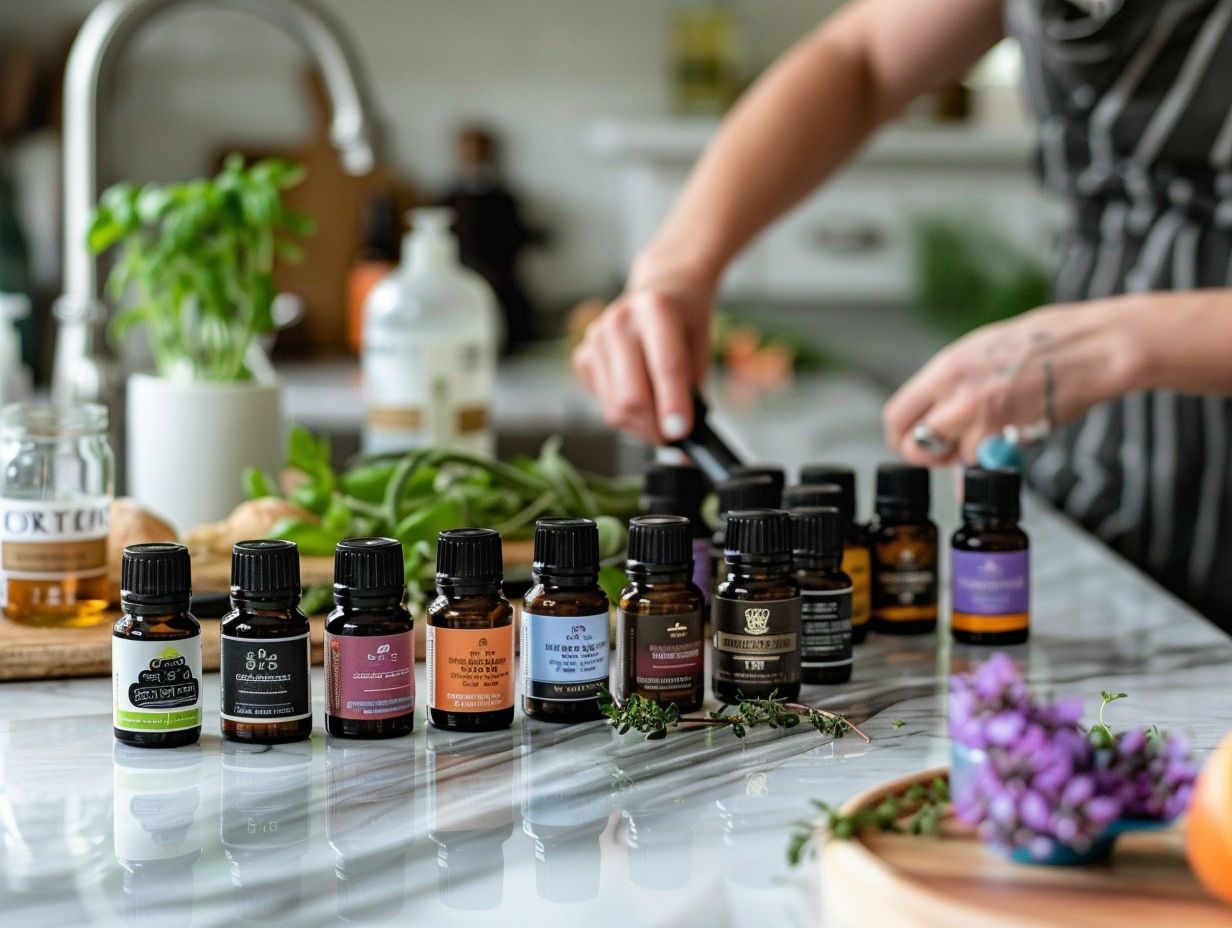
Among these popular essential oils,
- lavender brings a delicate floral essence to dishes and desserts, providing a soothing, slightly sweet undertone.
- On the other hand, lemon oil adds a bright, citrusy kick, perfect for enhancing both savory and sweet creations with its zesty flavor.
- Peppermint oil injects a refreshing minty note into recipes, ideal for adding a cooling element to beverages, chocolates, or even salad dressings.
- Finally, rosemary oil boasts a robust, pine-like aroma, elevating roasts, stews, and marinades with its earthy and herby profile.
How Do You Use Essential Oils in Cooking?
Essential oils can be used in cooking by adding a few drops to recipes for flavor enhancement. They should be diluted properly to avoid overpowering the dish.
When integrating essential oils into cooking, it is crucial to remember that dilution is key. One method is to dilute essential oils by blending them with carrier oils, such as olive or coconut oil, before adding them to dishes.
- Another effective way to incorporate essential oils into cooking is by creating infused oils. By infusing olive or grapeseed oil with the desired essential oil, the flavor is evenly distributed throughout the dish
- It’s recommended to start with a minimal amount of essential oil and gradually increase the quantity, tasting as you go to achieve the desired flavor profile without overwhelming the dish.
What Are Some Tips for Cooking with Essential Oils?
When cooking with essential oils, it’s essential to use high-quality oils, follow recommended dosages, and apply safety tips to prevent adverse reactions. Dilution and moderation are key considerations.
High-quality essential oils are sourced from reputable suppliers who offer pure, undiluted products. This ensures that you are not unknowingly ingesting harmful chemicals or additives that can be present in inferior oils.
When using essential oils in cooking, always start with a small amount and gradually increase to avoid overpowering flavors. It’s crucial to adhere to recommended dosages specified for culinary purposes to maintain both flavor balance and safety. Remember that essential oils are highly concentrated, so a little goes a long way.
It’s important to store oils in a cool, dark place away from direct sunlight to preserve their quality and potency for longer periods.
What Are the Benefits of Cooking with Essential Oils?
Cooking with essential oils offers benefits such as enhancing flavors, adding aromas, and potentially providing health benefits due to the natural compounds present in the oils.
When using essential oil crafts in cooking, you can easily intensify the taste of your dishes, creating complex and rich flavors that traditional spices alone might not achieve.
Essential oils provide a delightful aromatic component to your food, making the dining experience even more enjoyable and engaging for your senses.
Aside from flavor and aroma, these oils contain numerous compounds that are beneficial for your health, such as antioxidant and anti-inflammatory properties, which can help support overall well-being when incorporated into your meals.
Adds Flavor and Aroma
One of the key benefits of cooking with essential oils is their ability to add unique flavors and aromatic profiles to dishes, enhancing the overall culinary experience.
Essential oils are concentrated, volatile compounds derived from plants that retain the natural flavors and scents of their botanical sources.
When used in cooking, these oils infuse the dish with a rich depth of flavor that is hard to achieve with traditional herbs and spices.
Essential oils are incredibly versatile, allowing home cooks and professional chefs alike to experiment and create dishes with distinctive taste profiles that stand out.
May Have Health Benefits
Some essential oils used in cooking may offer therapeutic benefits such as anti-inflammatory or antimicrobial properties, contributing to overall health and well-being when consumed in moderation.
For example, peppermint oil is known for its digestive properties, helping to calm an upset stomach and aid in digestion. In contrast, lavender oil is praised for its calming effects, reducing stress and promoting relaxation. The use of essential oils like oregano or thyme can also provide immune-boosting benefits due to their antimicrobial properties.
When incorporated thoughtfully into culinary creations, these oils not only add flavor but also serve as a natural way to enhance health. From improving digestion to supporting immunity, the therapeutic benefits of these oils extend beyond mere taste, offering a holistic approach to well-being through food.
Can Be Used in Place of Fresh Herbs
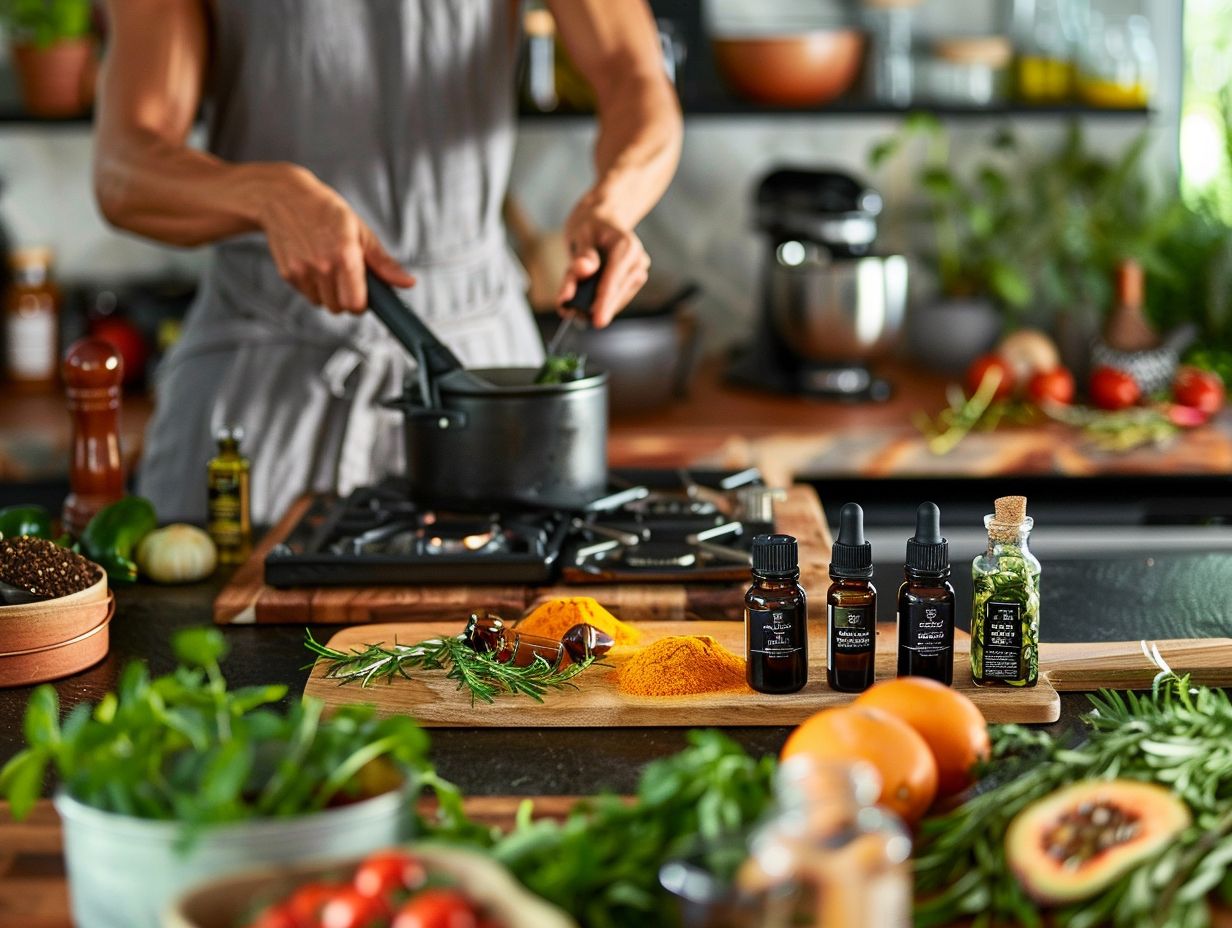
When using essential oils for culinary purposes, it’s vital to remember that they are highly potent, so only a tiny amount is needed to impart robust flavors. The versatility of essential oils allows you to experiment with various unique combinations and intensities, adding depth and complexity to your dishes. Unlike fresh herbs that may wilt or spoil quickly, essential oils have a longer shelf life and retain their potency for extended periods, making them a practical choice for enhancing your cooking. It’s crucial to dilute essential oils properly before use, either by mixing them with carrier oils or other ingredients to ensure their safe consumption.
What Are the Risks of Cooking with Essential Oils?
While cooking with essential oils can enhance dishes, there are safety concerns and controversies surrounding their use, including potential toxicity and improper ingestion.
One major risk of cooking with essential oils is that they are highly concentrated extracts, which can be harmful if used in excess or ingested improperly. Some oils may also be toxic when heated to high temperatures, releasing harmful compounds into the food.
There is ongoing controversy over the safety of using essential oils in cooking, with concerns about their impact on liver and kidney function, potential allergic reactions, and the lack of regulation in the industry.
It is essential to exercise caution and consult a qualified professional before incorporating essential oils into your culinary practices to avoid potential health risks.
May Cause Digestive Issues
One risk of cooking with essential oils is the potential to cause digestive issues if ingested in high concentrations or by individuals with sensitivities. Proper dilution and moderation are crucial.
Certain essential oils, despite their aromatic and therapeutic properties, contain compounds that may be harsh on the digestive system when consumed internally. For instance, oils such as oregano, clove, and cinnamon are potent and can irritate the delicate lining of the stomach if not diluted adequately before ingestion. This can lead to symptoms like nausea, stomach upset, or even more severe reactions in some cases. To mitigate these risks, it is essential to dilute essential oils with a carrier oil or water before using them in cooking to ensure they are safe for ingestion.
May Cause Allergic Reactions
Cooking with essential oils can trigger allergic reactions in some individuals when ingested, highlighting the need for caution and allergy awareness when using oils in recipes.
It’s crucial to understand that while essential oils can add unique flavors and scents to dishes, they are highly concentrated substances and can be potent triggers for allergies. Individuals sensitive to certain plants or botanicals may experience adverse reactions when consuming food infused with essential oils.
Common symptoms of allergic reactions to essential oils when consumed include nausea, vomiting, stomach discomfort, or respiratory issues. It’s essential to consult with a healthcare provider or allergist if you suspect an allergic response to essential oils in cooking.
Can Be Toxic if Used Incorrectly
Improper use of essential oils in cooking can lead to toxicity due to the concentrated nature of the oils.
Essential oils, derived from plants, are highly potent substances that contain powerful aromatic compounds. When these oils are misused in cooking, it can result in a variety of health risks, ranging from mild irritation to severe poisoning.
Safely incorporating essential oils into culinary creations involves meticulous attention to dosage and proper dilution. The safety guidelines provided by reputable sources and experts serve as essential tools in maintaining the therapeutic benefits of essential oils while minimizing the risk of toxicity. Experimenting with essential oils in cooking requires careful consideration and a deep understanding of their potential impacts.
How Can You Ensure the Safety of Cooking with Essential Oils?
Ensuring the safety of cooking with essential oils involves following FDA-approved guidelines, taking necessary precautions, and consulting with a health care professional for advice on proper usage.
In terms of safety concerns regarding essential oils, it is crucial to remember that not all oils are safe for ingestion.
Before using any essential oil for cooking, it is recommended to check if it is FDA-approved for culinary use. Always dilute essential oils appropriately and avoid eating essential oils in high heat cooking methods to prevent potential hazards.
Precautions such as storing oils out of reach of children and pets, carefully reading labels for usage instructions, and seeking advice from a qualified aromatherapist or healthcare provider can further enhance safety measures in your culinary adventures.
Frequently Asked Questions
Can You Cook With Essential Oils?
Yes, you can cook with essential oils! However, it is important to use them safely and in the correct amount to avoid any potential health risks.
What types of essential oils can be used for cooking?
Only food-grade essential oils should be used for cooking, as they are safe for ingestion. Some common essential oils used in cooking include lemon, peppermint, and basil.
How do you use essential oils in cooking?
Essential oils should never be added directly into a dish, as they are highly concentrated. Instead, they should be diluted with a carrier oil or mixed with a small amount of water before adding to food.
What are the benefits of cooking with essential oils?
Essential oils can add a burst of flavor to dishes without the need for extra ingredients. They also have potential health benefits, as they are derived from plants and contain their natural properties.
Are there any precautions to take when cooking with essential oils?
Yes, it is important to remember that essential oils are highly concentrated and should be used sparingly in cooking. It is also recommended to consult with a certified aromatherapist before using essential oils for cooking.
Can essential oils be substituted for herbs or spices in cooking?
Yes, a small amount of essential oil can be used in place of herbs or spices in cooking. However, it is important to note that they are much more potent than their dried or fresh counterparts, so the amount used should be adjusted accordingly.

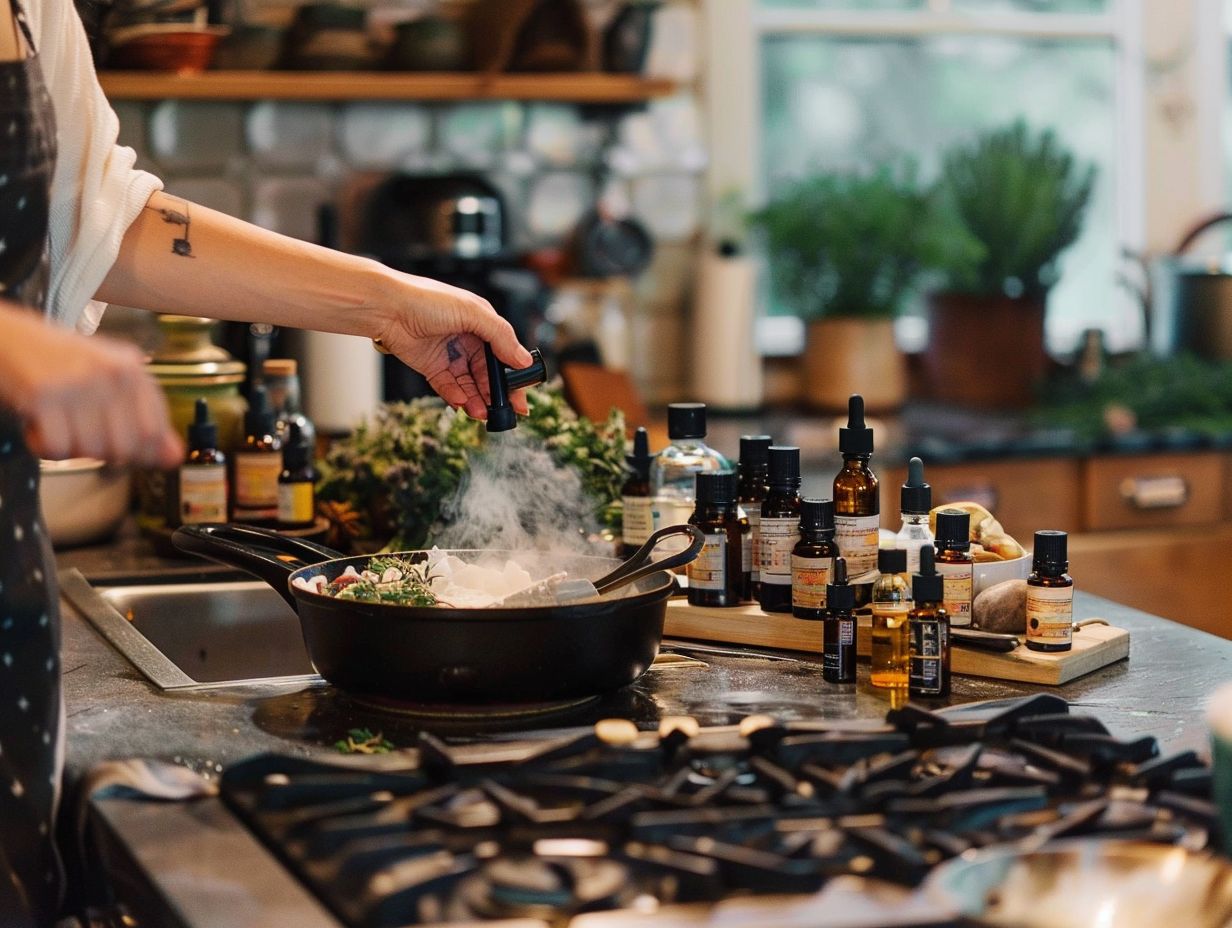
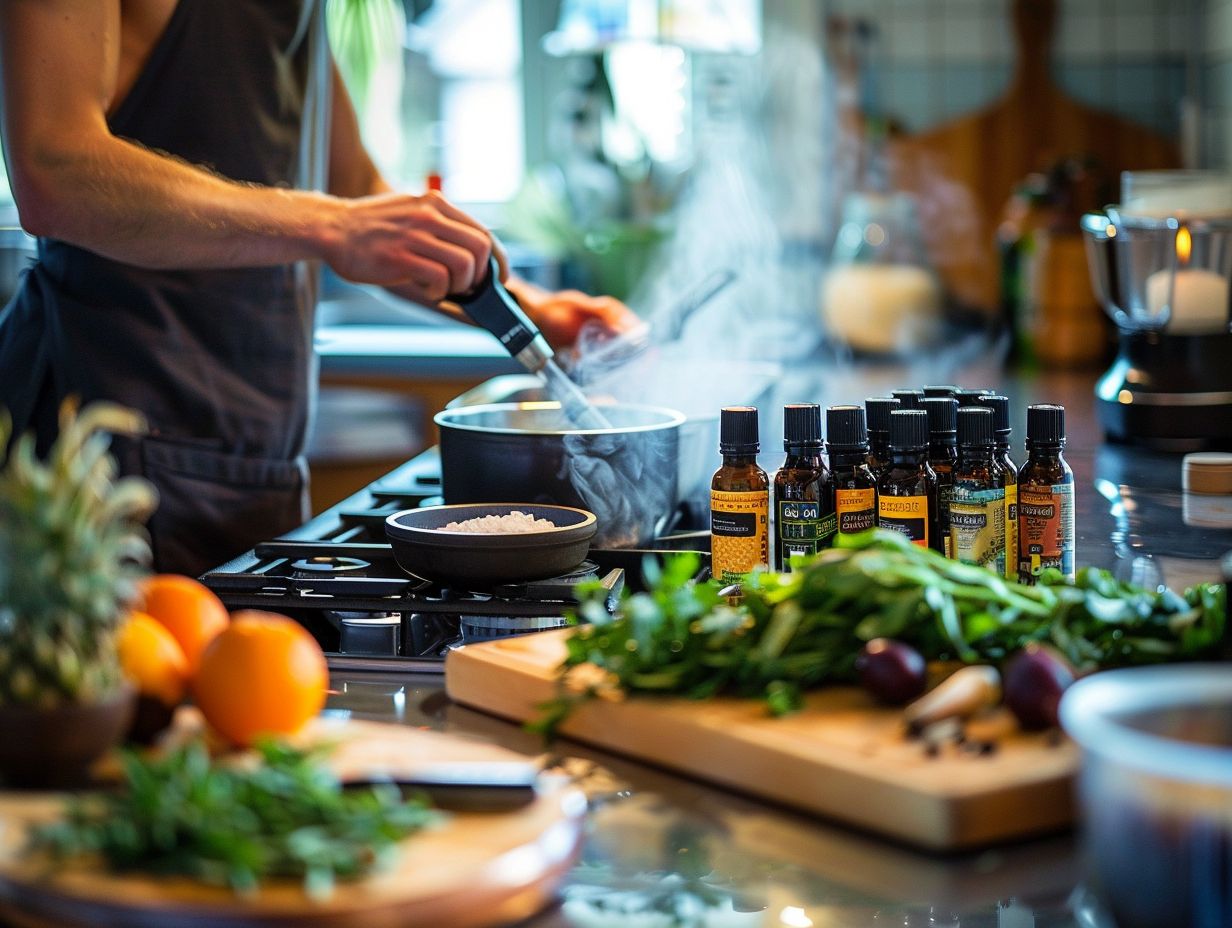



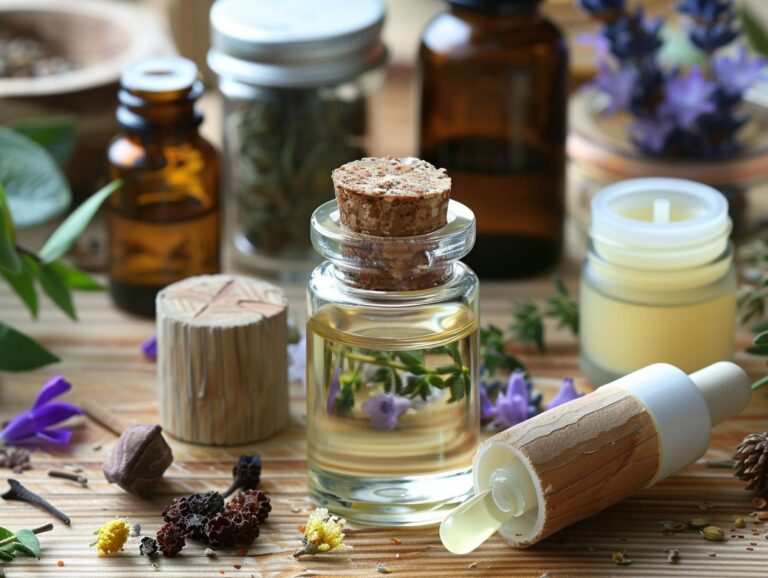

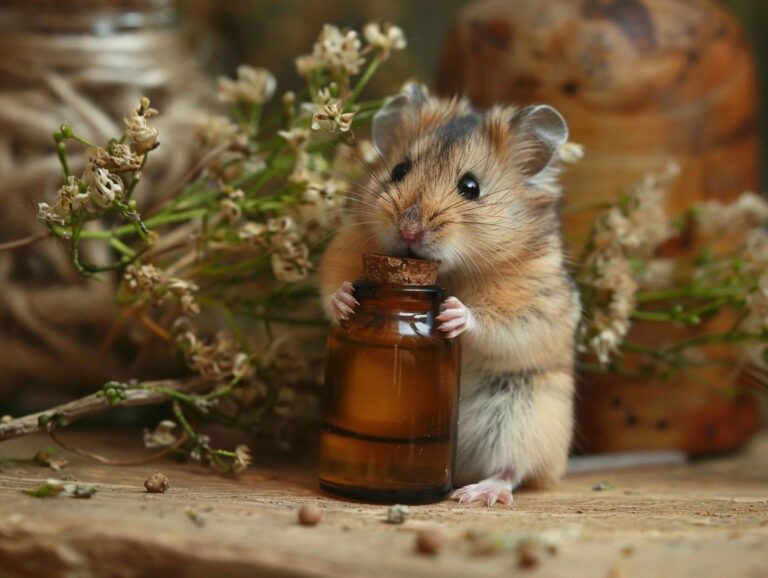
4 Comments